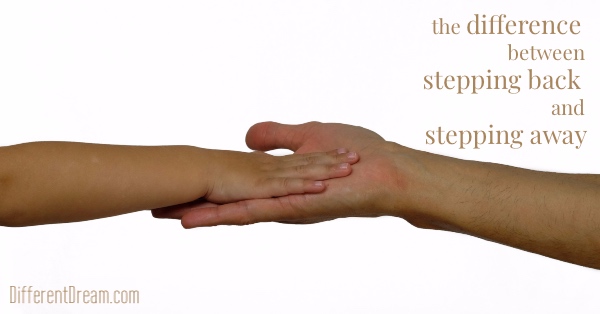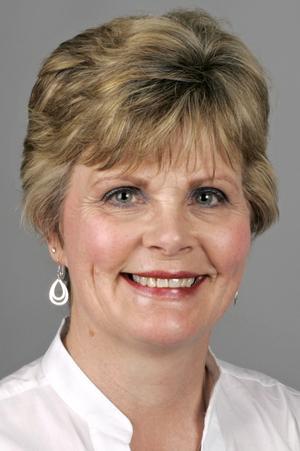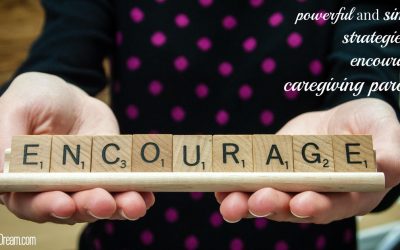Stepping Back Isn’t Stepping Away

Stepping back isn’t the same as stepping away. Guest blogger Kathy Guzzo, who cares for adult children with special medical needs, explains the difference between stepping back and stepping away in this post.
Our hope for loved ones with special needs is for them to be their best, which at times requires a choice for caretakers to take a step back while their loved one moves forward. However, at this point, it’s important to remember that stepping back doesn’t mean we’re stepping away.
The Preparation Process
When a child takes her first steps, she’s not set on the floor, and expected to walk. It’s a process from being held in a standing position to toddling across a room while holding a hand. But the preparation process toward walking begins in their tiny bodies at the moment of birth.
The same is true for anyone hoping to accomplish any goal, large or small. Whether it’s learning to eat with a utensil, read, throw a ball, swim, do household chores, shop, or use a walker. The preparation process is the key to success. For caretakers this is a natural progression, but at times the process must be deliberate, requiring a step back.
Stepping Back Isn’t Stepping Away
Loved ones observe daily the gradual progression of a toddler preparing to take that first steps. The caregiver knows that what comes next involves a risk. This is when the caregiver must choose to step back and allow the child to try. Not retreating far. Never turning their back to her. It’s an exciting moment, something both have worked towards. Close enough to protect her from harm while watching and encouraging. If the child falls the caregiver is close enough to quickly scoop her up, give a hug and make the decision of when to try again.
Stepping back to allow a loved one to try something new can be a difficult choice.
It requires confidence in both parties. Remaining close enough to observe, yet far enough away to let the other person know the end result is up to him. In contrast, stepping away is like turning a back on a toddler ready to take those first steps, hoping she figures it out and doesn’t get hurt.
Stepping away is expecting results without giving support.
Sometimes we’re hesitant to let our loved ones move forward on their own. We hope to protect them from being hurt or failing, which in our minds may mean we‘d failed in the preparation process. We need to take time to reflect on the journey to this point, including the obstacles overcome. This reflection may be the boost needed to help us change our roll from coach to cheerleader.
Stepping back is an act of love.
Stepping away because we’re tired or frustrated is selfish.
Stepping back gives a sense of accomplishment, a chance of someone we love dearly to grow in confidence.
Stepping away may create guilt and resentment.
Stepping back requires commitment while paying attention in order not to miss the opportunities when they arise.
Stepping away is at times the easier thing to do.
When the opportunity to step back knocks, as caregivers we can share the moment from a distance, while our loved ones take the next steps to being the best they can be.
Do you like what you see at DifferentDream.com? You can receive more great content by subscribing to the monthly Different Dream newsletter and signing up for the daily RSS feed delivered to your email inbox. You can sign up for the first in the pop up box and the second at the bottom of this page.

By Kathy Guzzo
Kathy Guzzo and her husband live in Northern Illinois and have 4 adult children. One of her daughters was diagnosed with lupus and Epstein Barr Replication as a young adult. Another began struggling with depression and OCD in her mid-twenties. She understands the need for her daughters to be able to make their own decisions regarding their health, but the nurturer in her sometimes has a hard time letting go. She desires to direct others to the peace and hope that God has abundantly available for them.
Subscribe for Updates from Jolene
Related Posts
Meeting Sensory Needs with Fidgets and Fiddles
Mark Arnold offers ideas about meeting sensory needs through fidgets and fiddles in this post. Check out these great sensory box additions.
Professional Bullying Is Not Okay
To be effective advocates for our kids with disabilities and special needs, sometimes we must recognize and stand up to professional bullying.
Extended Family Members Can Use the 5 Love Languages to Encourage Caregiving Parents
Extended family members can use the 5 love languages to create support networks for caregiving parents. Here are 5 practical how-to ideas.






0 Comments